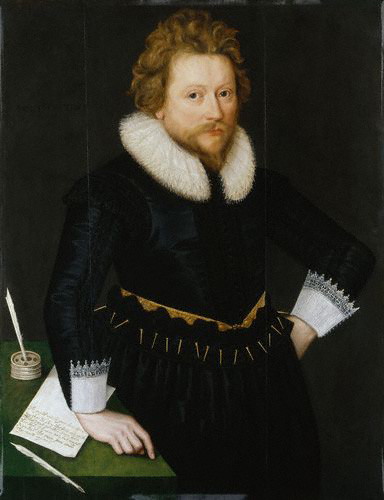“Let's meet and either do or die.”
The Island Princess (c. 1620; published 1647), Act II, scene 2. Compare: "Let us do or die", Robert Burns, Bannockburn; same in Thomas Campbell, Gertrude of Wyoming, part iii. stanza 37.
Джон Флетчер — английский драматург времён Якова I, работавший преимущественно в сотрудничестве с Фрэнсисом Бомонтом. В 1607—14 годах они писали пьесы для лондонской труппы Kings' Men . Бомонт и Флетчер вошли в историю как яркие мастера драмы шекспировской эпохи, создатели жанра трагикомедии. После смерти Бомонта Флетчер сотрудничал в основном с Филиппом Мэссинджером.
Отец Джона — Роберт Флетчер — последовательно занимал епископские кафедры в Бристоле, Вустере и Лондоне, а его дядя Джайлс известен своим описанием Московии. Джону ещё не было двенадцати, когда его отправили учиться в Оксфордский университет. Первые свидетельства его литературных занятий — хвалебные стихи к комедии «Вольпоне» Бена Джонсона . Драматург умер, когда в Лондон пришла «чёрная смерть», из-за того, что вместо отъезда из заражённого города поехал снять мерку к портному.
Перу Флетчера принадлежит не менее полусотни сохранившихся пьес; из них по крайней мере 15 написаны им самостоятельно. Остальные появились в результате его сотрудничества с другими драматургами, включая Бена Джонсона, Джорджа Чапмена и, вероятно, Уильяма Шекспира . Наиболее значительны из его произведений пьесы, написанные совместно с Бомонтом — «Филастр», «Трагедия девушки», «Король и не король».
Персонажи Флетчера — как правило, не живые люди из плоти и крови, а ходульные воплощения классических добродетелей и пороков. Действие его с Бомонтом пьес происходит в далёких, баснословных странах. Героям приходится делать взаимоисключающий выбор между крайностями. Монологи эмоционально перегружены и не свободны от риторических излишеств. Эти качества ещё более заострены в драмах собственно Флетчера с их рыхлой, эпизодической структурой, неправдоподобными сюжетными ситуациями и блещущими остроумием диалогами.
О личной жизни Флетчера известно мало. Джон Обри утверждал, что Флетчер и Бомонт жили в одном доме, спали в одной кровати, носили одну одежду и делили любовницу. Есть сведения, что Флетчер был похоронен в Саутваркском соборе в одной могиле с Мэссинджером.
Wikipedia

“Let's meet and either do or die.”
The Island Princess (c. 1620; published 1647), Act II, scene 2. Compare: "Let us do or die", Robert Burns, Bannockburn; same in Thomas Campbell, Gertrude of Wyoming, part iii. stanza 37.
Act III, scene 2. Song.
Rollo, Duke of Normandy, or The Bloody Brother, (c. 1617; revised c. 1627–30; published 1639)
Вариант: Three merry boys, and three merry boys,
And three merry boys are we,
As ever did sing in a hempen string
Under the gallow-tree.
“Death hath so many doors to let out life.”
The Custom of the Country (with Philip Massinger; c. 1619–23; published 1647), Act II, scene 2
Compare: "I know death hath ten thousand several doors / For men to take their exits.", John Webster, Dutchess of Malfi (1623); act IV, scene ii
“And he that will to bed go sober
Falls with the leaf in October.”
Act II, scene ii. The following well-known catch, or glee, is formed on this song: "He who goes to bed, and goes to bed sober, Falls as the leaves do, and dies in October; But he who goes to bed, and goes to bed mellow, Lives as he ought to do, and dies an honest fellow".
Rollo, Duke of Normandy, or The Bloody Brother, (c. 1617; revised c. 1627–30; published 1639)
“Of all the paths lead to a woman's love
Pity's the straightest.”
The Knight of Malta (1647), Act I, sc. i.
“There's nothing that allays an angry mind
So soon as a sweet beauty.”
Act III, scene 5.
The Elder Brother (c. 1625; published 1637)
“As high as Heaven, as deep as Hell.”
Act IV, scene 1.
The Honest Man's Fortune, (1613; published 1647)
“What mare's nest hast thou found?”
Act IV, scene 2.
The Tragedy of Bonduca (1611–14; published 1647)
“Whistle, and she'll come to you.”
Act IV, scene 4.
Wit Without Money (c. 1614; published 1639)
Act V, scene 5.
The Tragedy of Bonduca (1611–14; published 1647)
“All things that are
Made for our general uses are at war,—
Even we among ourselves.”
The Honest Man's Fortune, (1613; published 1647)
Act IV, scene i. Compare: "Take, O, take those lips away, That so sweetly were forsworn; And those eyes, the break of day, Lights that do mislead the morn: But my kisses bring again, bring again; Seals of love, but sealed in vain, sealed in vain", William Shakespeare, Measure for Measure.
Rollo, Duke of Normandy, or The Bloody Brother, (c. 1617; revised c. 1627–30; published 1639)
“Lie lightly on my ashes, gentle earthe.”
Act IV, scene 3. ("Sit tibi terra levis," familiar inscription).
The Tragedy of Bonduca (1611–14; published 1647)
Comedy of Monsieur Thomas (c. 1610–16; published 1639), Act III, scene 1.
The Lover's Progress (licensed 6 December 1623; revised 1634; published 1647), Act I, scene 1.
Act I, scene 1.
The Little French Lawyer (c. 1619–23; published 1647)
Rule a Wife and Have a Wife (licensed 19 October 1624; 1640), Act III, scene 5.
Act V, scene 2.
The Tragedy of Bonduca (1611–14; published 1647)
Act II, scene 1.
The Little French Lawyer (c. 1619–23; published 1647)
Act V, scene 2. Compare William Shakespeare, The Taming of the Shrew, introduction, scene 1, line 5. Also Scene 2, line 146. ("Slip" in folio).
Wit Without Money (c. 1614; published 1639)